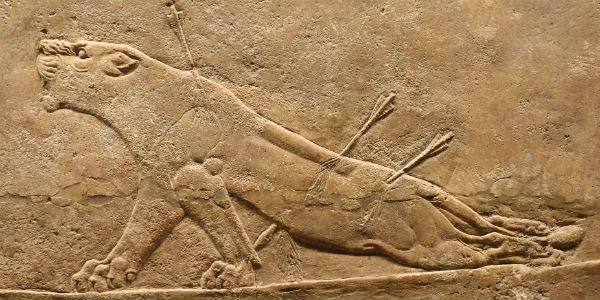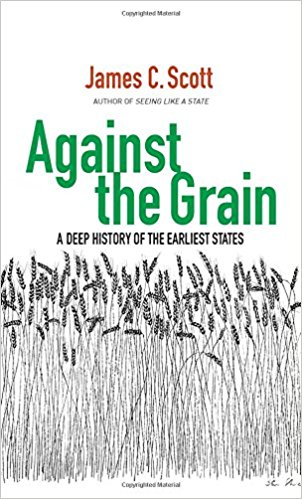Book review | Against the Grain: A Deep History of the Earliest States
In Against the Grain: A Deep History of the Earliest States, James C Scott contributes to his longstanding intellectual project of re-evaluating the role of the state in political thought by looking at the development of the early agrarian states to challenge narratives of progress founded on state formation. While acknowledging that a number of objections can be raised against the historical claims of the book, Alex Sager praises it for encouraging vital critical interrogation of the supposed inevitability and neutrality of state institutions today.

Lion hunt, from the north palace of Nineveh, Mesopotamia. Photo: ton de preter. Public domain
Against the Grain: A Deep History of the Earliest States. James C. Scott. Yale University Press 2017.
With the exception of a few anarchists, political philosophers have extolled the rise of the state as a crucial stage in human progress. We see this in the social contract tradition from Thomas Hobbes to Immanuel Kant where people abandon the state of nature and submit themselves to an authority that upholds positive and natural law. Hegel saw the rise of the state as realising both individual freedom and social unity as the culmination of world history. In our times, Francis Fukuyama has carried the Hegelian torch by extolling this progressive narrative, most famously by proclaiming the end of history. More recently, he contends that the evolution of bureaucratic independence, democratic accountability and rule of law has led to political order and prosperity, a goal he describes as ‘getting to Denmark’. In recent years, the ‘New Optimists’, led by Max Roser, Johan Norberg and Steven Pinker, tell us that things have never been better. Pinker in particular has been a particularly fervorous evangelist for the state, which he insists accounts for an unprecedented decline of violence.
James C. Scott wants no part of these paeans to progress. In his view, these narratives have their roots in the propaganda of the agrarian kingdoms that arose in the Tigris and Euphrates Valley around 3100 BCE. Built into this is a mythology centred around the divine origins of grain and ‘the assumption that the sedentary itself is superior to and more attractive than mobile forms of subsistence’ (8): an assumption succinctly captured by Owen Lattimore in his classic essay as ‘The Wickedness of Being Nomads’.
Against the Grain builds on The Art of Not Being Governed and Two Cheers for Anarchism as part of Scott’s longstanding project of teaching us how to avoid seeing like a state. The Art of Not Being Governed demolished the myth that many people lived outside of the state simply because they had never been exposed to the gift of civilisation. Instead, non-state peoples actively sought to avoid the state and its taxes, conscription and forced labour. In Against the Grain: A Deep History of the Earliest States, Scott continues to subvert the narrative of progress, contending that the foundation of early states was not consent but violence, that their rise may very well have led to a decline in living standards and that they were prone to collapse.
As the title suggests, Against the Grain is not simply a reconstruction of the rise of the ancient state; rather, it aims at a re-evaluation of the state’s role in our political thought (26-27). The obstacles to Scott’s task are formidable. Many today have trouble imagining life outside of the state (14). History has privileged states because they leave a record for archaeologists of ‘invariably state-centric texts: taxes, work units, tribute lists, royal genealogies, founding myths, laws’ (13). Even after the rise of the early states, much of the world’s population – in state parlance, ‘barbarians’ – lived outside its borders. Unfortunately, they left little record of their activities and worldviews. Moreover, archaeology and history tend to be state-sponsored, often for explicitly political motives (13).
Against the Grain focuses on Mesopotamia to overturn the dominant narrative of the state’s rise. According to this, the domestication of plants and animals led to people settling in one place. Agriculture allowed for the support of large groups of people and increased specialisation (along with stratification). People migrated to cities for the opportunities and splendour of civilisation. The decline or collapse of states was always a tremendous loss.
Scott considers much of this narrative false. Sedentism does not have its origins in plant and animal domestication. The first stratified states in the Tigris and Euphrates Valley appeared ‘only around 3,100 BCE, more than four millennia after the first crop domestications and sedentism’ (7). Sedentism has its roots in ecologically rich, preagricultural settings, especially wetlands (10). Agriculture co-existed with mobile lifestyles in which people gathered to harvest crops. Domestication itself is part of a 400,000 year process beginning with the use of fire (38-42). Moreover, it is not a process (or simply a process) of humans gaining increasing control over the natural world. People find themselves caring for dogs, creating an ecological niche for mice, ticks, bedbugs and other uninvited guests, and spending their lives ‘strapped to the round of ploughing, planting, weeding, reaping, threshing, grinding, all on behalf of their favorite grains and tending to the daily needs of their livestock’ (19).
The shift to agriculture was in some respects also harmful. Osteological research suggests that domiciled Homo sapiens who depended on grains were smaller, less well-nourished and, in the case of women, more likely to be anaemic, than hunter-gatherers (84). They also found themselves vulnerable to disease and able to maintain their population only through unprecedentedly high birthrates (113). Scott also suggests that the move from hunting and foraging to agriculture resulted in ‘deskilling’, analogous to the move in the industrial revolution from the master tradesman’s workshop to the textile mill (92). State taxation compounded the drudgery of raising crops and livestock. Finally, the reliance on only a few crops and livestock made early states vulnerable to collapse (112), with the reversion to the ‘dark ages’ possibly resulting in an increase in human welfare (xii).
Why, then, would people choose to join the state? Scott’s answer is that they didn’t. An ecologically rich area is not a sufficient condition for a state to arise; it may even be a barrier since people can easily thrive outside of its grasp. State survival depends on the ability to immobilise and administrate populations so that they can be recorded, measured, taxed, conscripted and enslaved. As a result, states arise in floodplains, not deserts or mountainous regions, and their walls may have served to keep taxpayers in as well as invaders out (30).
Scott observes that almost all classical states had their basis in grain – hence the title of his book (21). Unlike many crops, grain ripens simultaneously and is thus visible and accessible to the tax collector (132). The ability to measure and record allows for state control of other humans: slaves, state subjects and women in the patriarchal family (xii-xiii). In response, many people fled the state to join the ‘barbarians’ (232) who thrived by raiding, extracting tribute and trading with states as well as by supplying them with slaves and mercenaries (256).
Against the Grain reminds us that current political arrangements are neither natural nor eternal. Nonetheless, its political significance is elusive. Scott is not merely interested in explaining the rise of the early state (and, despite his many insights, his explanation is at best incomplete). His project also judges the state and finds it wanting. There are at least three objections here. First, his one-sided narrative of the rise of states ignores the good they do. As Fukuyama might put it, is Denmark really so bad? Second, Scott extols the virtues of life outside of the state, but says little about its vices, suggesting that the only reason people would join the state is coercion. Third, even if we fully accept his account, his evidence is exclusively historical and we can conclude little about contemporary states by reflecting on their earliest origins.
Scott is surely aware of these limitations – after all, he gives only ‘two cheers’ for anarchism. He is not a primitivist, advocating a return to hunting and gathering. And given that these objections are obvious, he must be up to something else. Against the Grain invites us to critically appraise our institutions. The rise of the state and its appetite for natural resources – central to fuelling state-centric conceptions of development or progress – continues to be devastating for indigenous peoples and uncontacted tribes. The continued bias toward sedentary lifestyles parallels the ‘determined resistance by mobile peoples everywhere to permanent settlement, even under relatively favourable circumstance’ (8). State persecution of nomads continues today, targeting mobile groups such as the Roma and the UK traveller community as well as refugees and other migrants. Against the Grain does not call for the rejection of the state, but rather its re-examination. In this, it brilliantly succeeds.
This post represents the views of the author and not those of Democratic Audit. it first appeared at the LSE Review of Books.
Alex Sager is Chair of the Philosophy Department at Portland State University. His monograph Toward a Cosmopolitan Ethics of Mobility: The Migrant’s-Eye View of the World (Palgrave) appears in January 2018. Follow him on Twitter: @aesager.

 Find this book:
Find this book: 



 Democratic Audit's core funding is provided by the Joseph Rowntree Charitable Trust. Additional funding is provided by the London School of Economics.
Democratic Audit's core funding is provided by the Joseph Rowntree Charitable Trust. Additional funding is provided by the London School of Economics.